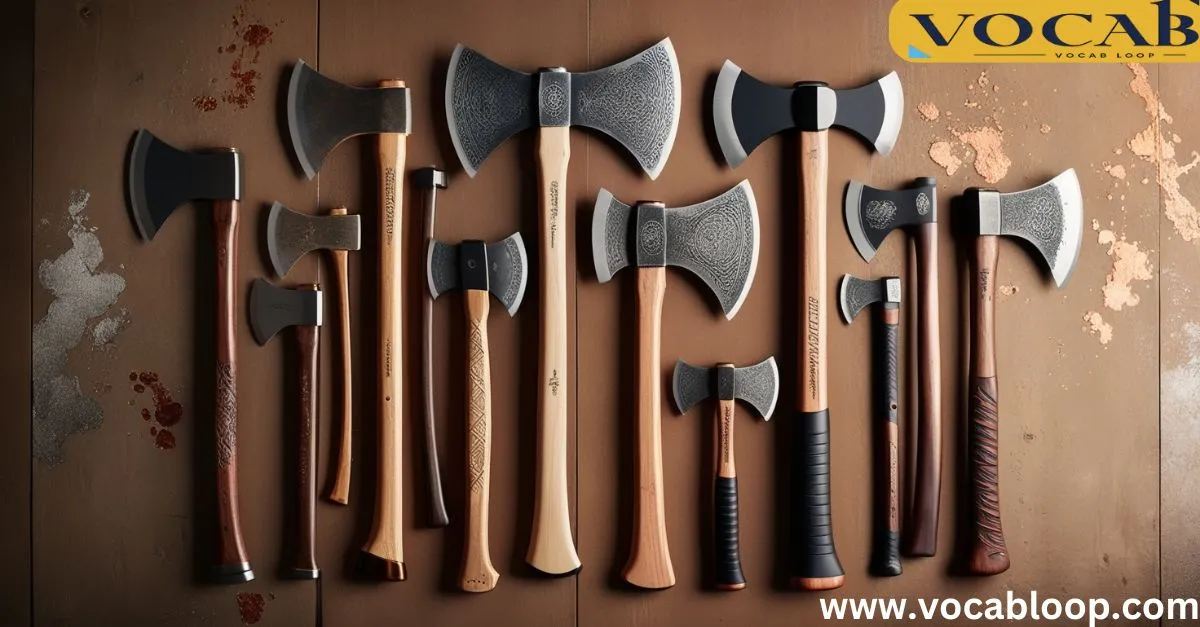The plural of axe represents one of humanity’s most fundamental tools, featuring a sharp metal blade on a wooden handle. This essential implement has shaped human progress through generations of woodcutting and building, making the question of how to properly write about multiple axes particularly relevant in both practical and cultural contexts.
When writing the plural of axe, many people find themselves confused between “axes” and “axen” as the correct form. This common grammatical question troubles both native speakers and language learners, but understanding the proper plural of axe is simpler than you might think—following a clear English rule that makes written communication precise and accurate.
Is the axe word correct?
The word axe is absolutely correct and has been used for centuries. In fact, it’s the standard spelling in most English-speaking countries worldwide. This simple yet powerful word represents one of humanity’s oldest tools, used throughout history for everything from felling trees to shaping wood.
When discussing proper language usage, it’s worth noting that both “axe” and “ax” are recognized forms, though axe remains the more traditional spelling. Modern writers and publishers often use both versions interchangeably, particularly in American English.
Definition
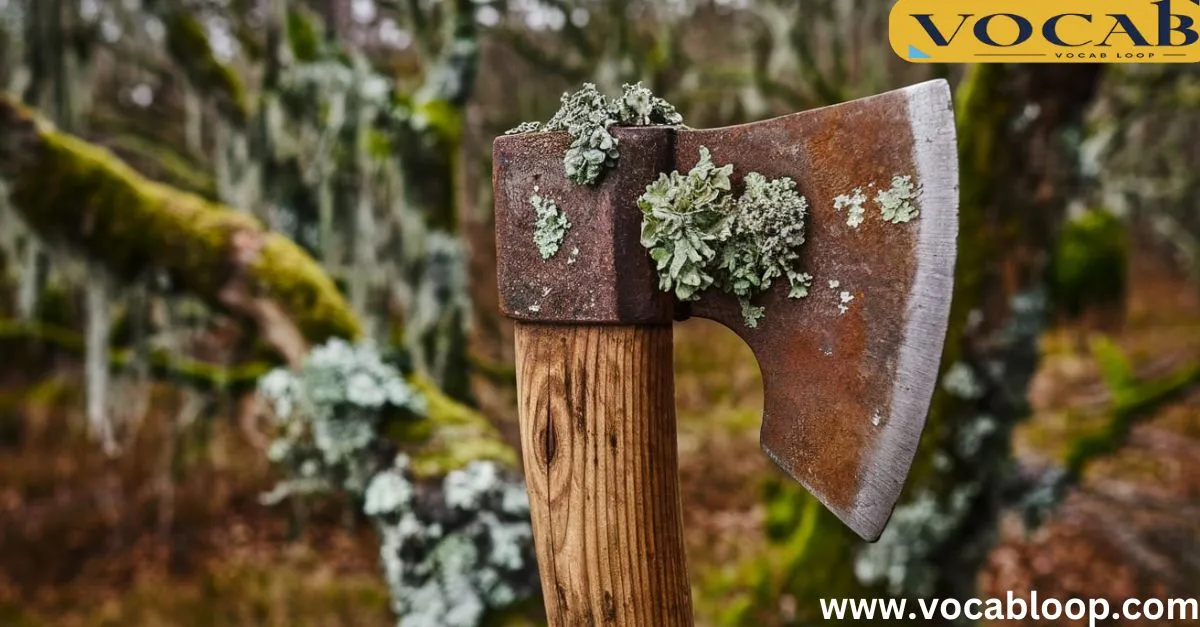
An axe is fundamentally a cutting tool consisting of a heavy steel blade attached to a wooden handle or haft.
This seemingly simple definition belies the tool’s incredible versatility and historical importance. From ancient times to modern day, the axe has served as both a crucial survival tool and a symbol of authority.
Meaning
Beyond its literal definition as a cutting tool, the word axe has taken on various figurative meanings in modern usage. In business contexts, we often hear about “axing” projects or positions.
Musicians might refer to their guitar as their “axe.” These metaphorical uses demonstrate how deeply embedded this tool is in our cultural consciousness.
Pronunciation of Axe
The word axe is pronounced as /aks/, rhyming with “backs.” This pronunciation remains consistent across most English dialects, though slight regional variations exist. The plural form “axes” is pronounced as /ˈæksiz/, distinctly different from the mathematical term “axes” (/ˈæksiːz/).
Plural of Axe
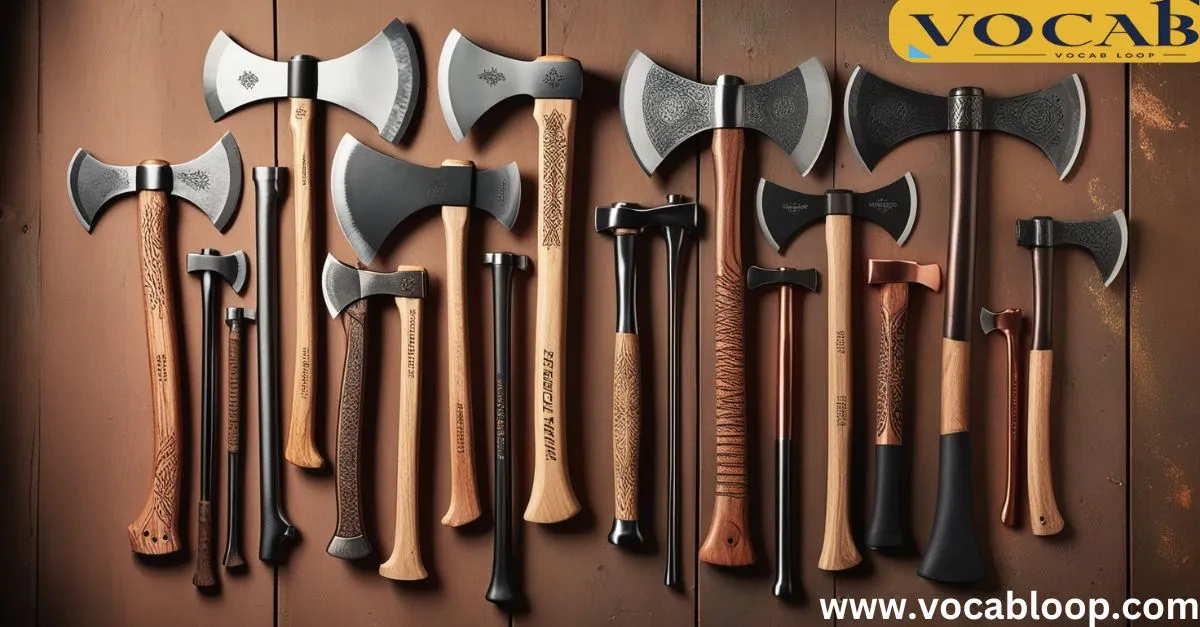
The correct plural form of axe is “axes.” This follows standard English pluralization rules for words ending in -e. Despite some confusion due to irregular plurals like “ox/oxen,” the word “axe” follows regular patterns. This makes it easier to remember once you understand the basic rule.
Why Axes not Axen?
Unlike the word “ox” which becomes “oxen” in its plural form, axe follows regular English grammar patterns. The -en plural ending is a remnant of Old English that survives in only a handful of words like children, brethren, and oxen. Understanding this historical context helps explain why we say “axes” and not “axen.”
Is it axes or axises?
This question has a straightforward answer: the correct plural is always axes. The form “axises” is never correct for the plural of axe. This follows standard English language rules for words ending in -x. Let’s look at some similar examples:
| Singular | Plural | Type of Plural |
| box | boxes | Regular -es |
| fox | foxes | Regular -es |
| matrix | matrices | Latin plural |
| index | indexes/indices | Both accepted |
| axe/ax | axes | Regular -es |
Quick Summary
The plural of axe is “axes,” adhering to regular English pluralization rules. While “axe” is the traditional spelling in British English and globally, “ax” is common in American English. Both spellings share the same plural form. The tool, with its sharp blade and wooden handle, has been an essential part of human history, symbolizing both utility and authority. The term also carries metaphorical meanings in modern contexts, such as in business or music.
Part of Speech
The word axe functions primarily as a noun and occasionally as a verb:
- As a noun: It refers to a tool with a blade used for cutting, splitting, or chopping.
- Example: “The firefighter carried an axe into the burning building.”
- As a verb: It means to remove, eliminate, or cut, often metaphorically.
- Example: “The company axed several underperforming projects last quarter.”
Both spellings (axe and ax) are used interchangeably without changing their grammatical function.
Some Nouns Ending in “-x” and Their Plurals
Understanding how words ending in -x form their plurals can help us better grasp why “axes” is correct. Here’s a comprehensive table of common examples:
| Singular | Plural | Usage Notes |
| box | boxes | Most common pattern |
| fox | foxes | Regular pattern |
| prefix | prefixes | Regular pattern |
| suffix | suffixes | Regular pattern |
| matrix | matrices | Latin origin |
| apex | apexes/apices | Both forms accepted |
| index | indexes/indices | Both forms accepted |
| vortex | vortexes/vortices | Both forms accepted |
Axe or Ax: What is the Difference?
The distinction between axe and ax primarily comes down to regional preferences in English language usage. While both spellings refer to the same tool, “axe” is the traditional spelling used in British English and most other English-speaking countries. “Ax” is more commonly found in American English, following a broader pattern of simplified spellings in the US.
Modern publications and writers often use both forms interchangeably, though “axe” remains more prevalent globally. The choice between the two often depends on your audience and regional context. Interestingly, both versions maintain the same plural form: “axes.”
Is ax grammatically correct?
Yes, ax is completely grammatically correct, particularly in American English. This shorter spelling emerged as part of a broader movement to simplify English spellings in American usage.
The trend followed similar patterns seen in words like “color/colour” and “flavor/flavour.” Both forms have equal validity in modern English writing.
Origins of the Word “Axe”
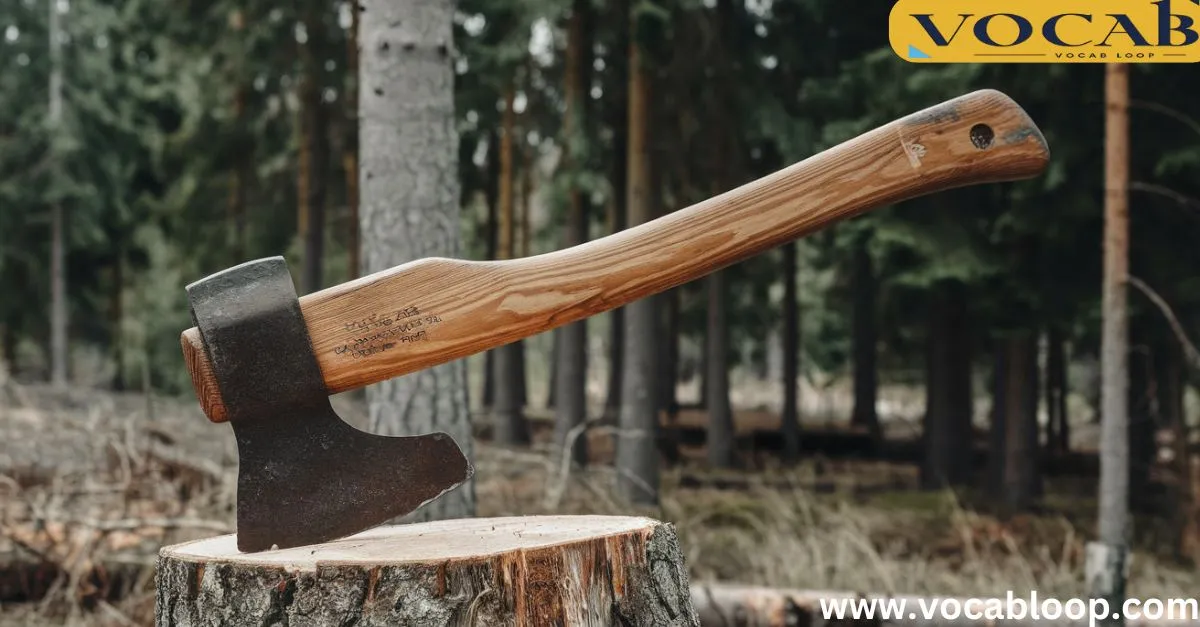
The etymology of “axe” presents a fascinating journey through language evolution. The word traces its roots back to Old English “æx,” which derived from Proto-Germanic “*akwisi.” This ancient lineage demonstrates the tool’s fundamental importance in human civilization.
Throughout history, the spelling has evolved through various forms including “exe,” “eax,” and finally settling on “axe” or “ax.” This evolution reflects broader changes in English language patterns and pronunciation over centuries.
Synonyms of “Axe”
The rich vocabulary surrounding this tool reflects its various uses and cultural significance. Here are some common synonyms and related terms:
| Term | Context/Usage |
| Hatchet | Smaller, one-handed version |
| Cleaver | Heavy-bladed cutting tool |
| Tomahawk | Native American weapon/tool |
| Battle-axe | Historical weapon |
| Pickaxe | Mining/digging tool |
| Broadaxe | Carpentry tool |
| Adze | Woodworking tool |
Examples in Sentences
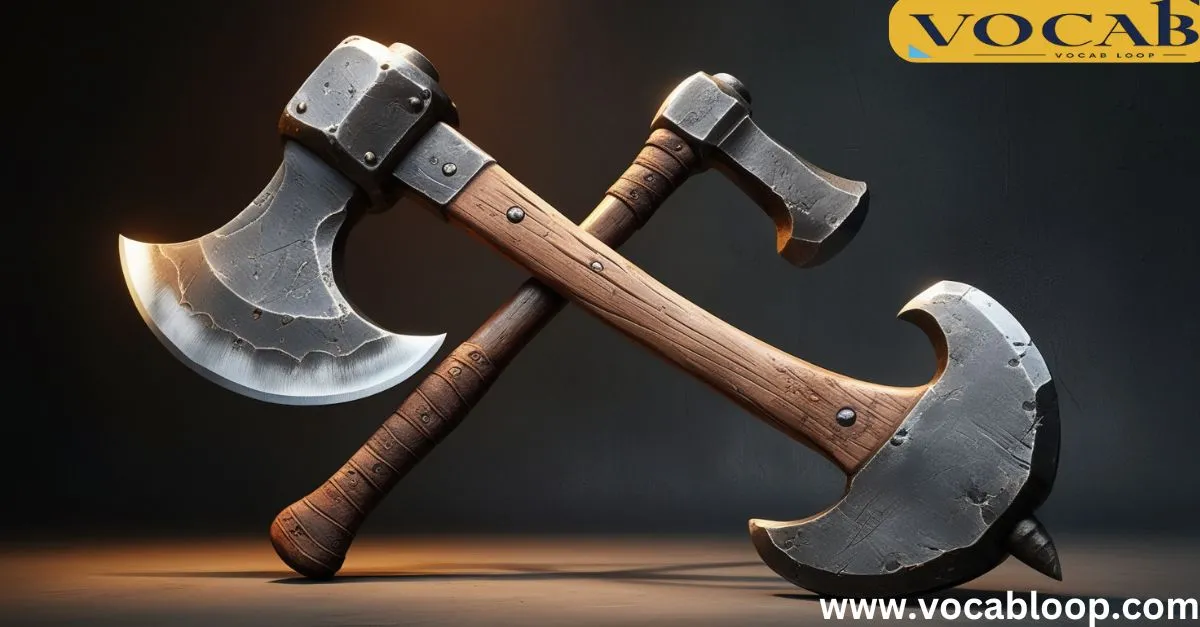
To better understand how these words are used in context, let’s examine some practical examples:
“Axe” in Sentences:
- “The lumberjack sharpened his axe before starting the day’s work.”
- “She inherited her grandfather’s ceremonial axe from the war.”
- “The museum displays several Stone Age axe heads.”
- “Unfortunately, the company had to axe several projects due to budget cuts.”
- “The firefighter carried an axe for emergency situations.”
- “Ancient warriors often preferred the battle axe over the sword.”
- “The archaeological team discovered a bronze axe at the dig site.”
- “He carefully restored the antique axe to its former glory.”
- “The survival kit included a small camping axe.”
- “The guitar player referred to his instrument as his axe.”
“Ax” in Sentences:
- “The woodsman grabbed his ax from the tool shed.”
- “She learned to throw an ax at the county fair.”
- “The pioneer’s ax was essential for survival.”
- “They had to ax the meeting due to weather conditions.”
- “He swung the ax with practiced precision.”
- “The competition featured professional ax throwers.”
- “The camping kit included a small hand ax.”
- “The museum curator cleaned the ancient ax.”
- “They used an ax to clear the fallen tree.”
- “The ax handle needed replacement after years of use.”
“Axes” in Sentences:
- “The hardware store displayed various axes for sale.”
- “Viking warriors carried both swords and axes into battle.”
- “The firefighters grabbed their axes before entering.”
- “The collection of ceremonial axes dated back centuries.”
- “They found several stone axes at the archaeological site.”
- “The museum showcased different types of axes through history.”
- “Medieval armies often used axes as primary weapons.”
- “The craftsman maintained his axes with great care.”
- “Competition throwers brought their own axes.”
- “The lumber camp needed new axes for the season.”
FAQs
What’s the main difference between a hatchet and an axe?
A hatchet is essentially a smaller, one-handed version of an axe, typically used for lighter work and easier to carry.
Does the plural form change between American and British English?
No, both “axe” and “ax” use the same plural form: “axes.”
Why do some axes have different head shapes?
Different head shapes serve various purposes, from splitting wood to felling trees to precise carpentry work.
What’s the origin of the phrase “to axe a question”?
This is actually a dialectical variant of “ask,” with different historical origins than the cutting tool.
Are double-bit axes better than single-bit axes?
Each has its purpose – double-bit axes offer two cutting edges but require more skill to use safely.
Conclusion
Understanding the plural of axe is straightforward: it’s always “axes,” regardless of whether you use “axe” or “ax.” This simple rule connects us to one of humanity’s oldest tools and its rich linguistic history.
Both spellings are correct, with “axe” preferred in British English and “ax” more common in American usage. The word’s versatility spans from literal woodcutting tools to metaphorical business decisions, showing how language evolves. Armed with this knowledge, you can confidently use any form of the word in your writing and speech.

Alex Hormozi is a seasoned blogger at Vocab Loop, known for his deep insights into language, vocabulary, and grammar. With years of experience in writing, Alex shares practical tips and effective strategies to help readers improve their linguistic skills and enhance their writing abilities.

